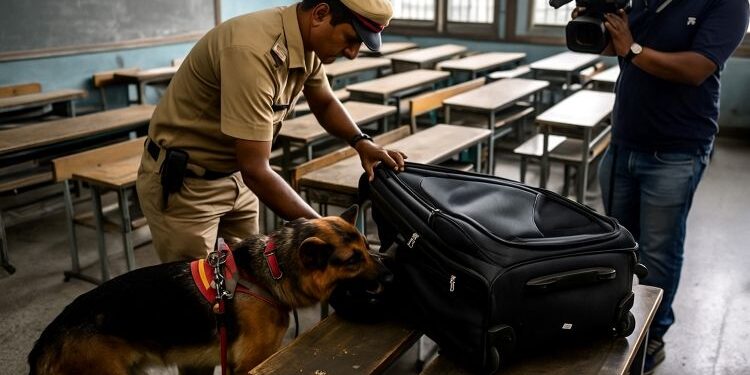The spate of threats marks the continuation of a worrying trend that began in early 2024, when schools in Delhi, Noida, Bengaluru, and Jaipur were repeatedly targeted with identical bomb threats sent from anonymous email accounts. In May 2024, dozens of Delhi and Noida schools had to be evacuated before the emails were declared hoaxes by the police. The situation intensified in July–August 2025, when over 300 schools were hit by near-simultaneous messages sent from addresses such as roadkill333@atomicmail.io and groups identifying themselves as “Terrorizers 111” or “Terrorizers111 x ViLE.”
Investigations by Delhi Police’s cyber units have revealed that most perpetrators use VPNs, proxy servers, Tor networks, and foreign-hosted email services, making it difficult to trace the origin of these threats. Some arrests have been made — including a Class 12 student accused of sending hundreds of hoax emails, and a Chennai-based suspect in a separate case — but the anonymity afforded by digital tools has slowed prosecutions and complicated attribution.
While all the threats so far have turned out to be false alarms, the implications are far from trivial. Entire schools have been evacuated, classes suspended, and thousands of anxious parents have rushed to collect their children amid scenes of panic. “Sending a single email can cost nothing — but the disruption it causes is enormous,” said a senior police officer, pointing to the diversion of bomb squads, fire brigades, and security personnel from other critical duties.
The recurring hoax threats come at a time when the education sector is already under siege from a broader wave of cyberattacks. A September report from Check Point Research (CPR), a leading cyber intelligence software provider, revealed that education and research organisations in India faced an average of 8,487 cyberattacks per week over the past six months — almost twice the global average.
Email remains the most common attack vector, accounting for 54% of incidents, with 58% of malicious emails carrying .exe attachments. The frequency of hoax threats has begun to raise concern among both security agencies and educators. Officials warn that repeated false alarms risk desensitising the system, potentially leading to complacency in the face of a genuine threat. That would be dangerous. Each threat — real or not — must be treated with full seriousness given the prevailing risk from terror groups.
The Delhi government, responding to court directions, issued a Standard Operating Procedure (SOP) last year outlining preventive and response measures for schools, including mock drills, CCTV monitoring, evacuation plans, and periodic safety audits. The Delhi Police’s Cyber Prevention, Awareness & Detection (CyPAD) unit has been conducting drills and forensic investigations as part of its ongoing campaign to improve preparedness.
In November 2024, the Delhi High Court (DHC), hearing a public interest litigation filed by lawyer Arpit Bhargava after a bomb threat at Delhi Public School, Mathura Road, directed the government to draw up a comprehensive SOP for school emergencies. In May 2025, the court issued fresh notices to the Chief Secretary and Police Commissioner over delays in implementing a full-fledged mechanism. The case is still in the court.
Beyond Delhi, several national bodies — including the Ministry of Electronics and Information Technology (MeitY), the Indian Cyber Crime Coordination Centre (I4C), and NCERT — have stepped up cyber safety initiatives. Through DIKSHA courses, Cyber Hygiene campaigns, and CBSE cyber-safety handbooks, these agencies are promoting digital literacy and cyber hygiene among students and teachers. Developed under MeitY’s Information Security Education and Awareness (ISEA) project, the programs aim to help users recognise phishing emails, suspicious attachments, and online scams.
Despite these efforts, there is a growing unease among school communities about the profile of many perpetrators. Police say several hoax emails appear to have been sent by students themselves, often as pranks or attempts to delay exams and other pretexts. “It’s disturbing that children are using such grave and illegal means for mischief on a scale seeing the pattern,” said a teacher. The psychological toll has also been heavy. There is heightened anxiety among children, teachers and parents. “Even when it’s a hoax, the trauma is real,” said a parent.
Educationist Srinivasan Sriram, Principal of The Mann School, Delhi, and a National Awardee for ICT Innovation in Education, believes the issue is serious and needs attention and suggests it must be tackled in three broader ways. “First, there needs to be deterrence — strict punishment and financial liability for such actions,” he said. “Parents of those involved should bear the costs of public resources wasted during evacuations and bomb squad operations. The law has to be strict.”
Sriram also emphasised the need for stronger technical surveillance to trace culprits and a nationwide awareness campaign on the lines of anti-drug drives and proactively engaging experts. “Most of this happens at home, not in schools,” he added. “Parents need to be sensitized and empowered — because digital discipline begins at home.”
The hoax bomb threats, alongside a rising tide of cyberattacks and data breaches, underline a stark reality: cybersecurity is no longer optional in education. Protecting school networks and communication systems is now essential not just to safeguard data, but to preserve the psychological and physical safety of students and staff. Increasingly, cybercriminals are using artificial intelligence to craft phishing messages and deepfake content that mimic school portals or fee-payment systems, often tricking unsuspecting users into revealing passwords or downloading malware.
Experts say the solution lies in a coordinated approach that blends law enforcement, cyber hygiene education, technical defences, and community engagement. As classrooms become increasingly digital, ensuring cybersecurity has become inseparable from protecting academic integrity — and the trust and safety of millions of learners across India.
Dr Reena Kasana, assistant professor at Delhi University’s Department of Computer Science, says early education of cyber laws will be beneficial. “Students send bomb threat emails considering it as a prank. However, the curriculum should include that it is a cybercrime. It may have consequences such as a permanent criminal record, not eligible for good colleges, etc.,” adding, “Schools can organise cyber hygiene workshops for parents (may be on PTM day) to ensure that parents can also teach the same at home. It might stop the blame game between the school and parents.”
—Autar Nehru













